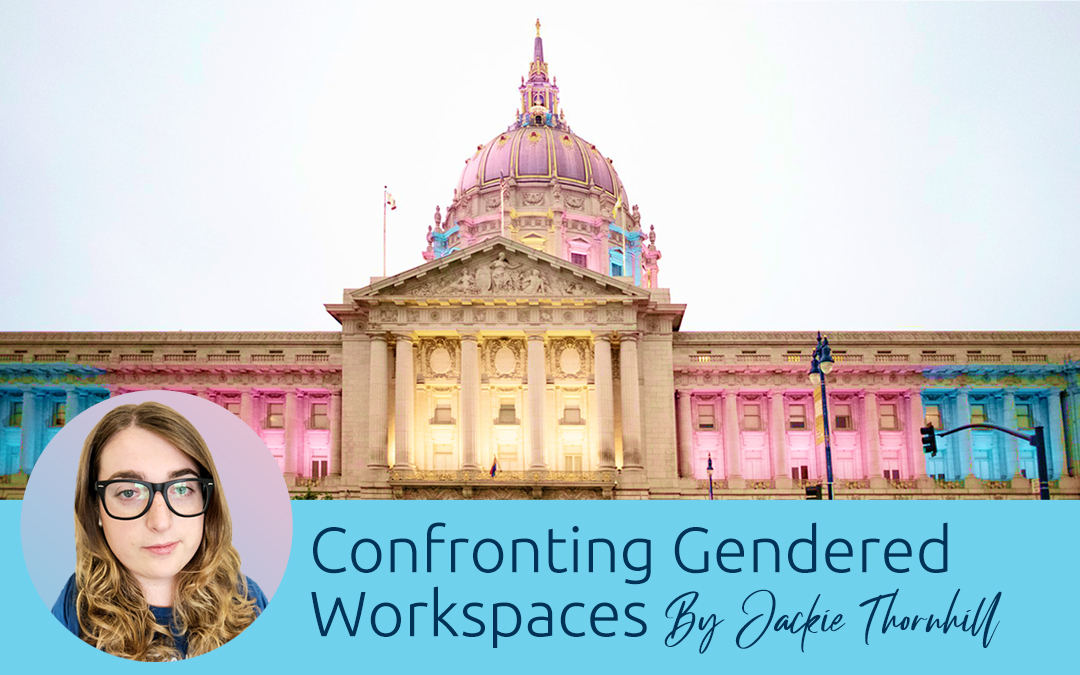
Confronting Gendered Workspaces
by
It was a humid Saturday afternoon in Kentwood, Michigan, sometime in August, 2018, and I was eager to get through my next volunteer training. Standing at the helm of a bland, windowless conference room and wielding a dry erase marker, I ran through the process of pitching the Congressional candidate I worked for while a small group of bored seniors stared in silence.
As I wrapped up, one volunteer leaned over to his buddy and remarked, “he talks so fast, he’s like a New Yorker with a suntan.” The familiar pang of disappointment that comes with being misgendered hit, and I immediately blamed myself – I always slip up with my voice, the bane of many trans women’s existences. I ignored the remark in the moment, focusing instead on wrapping up the training.
Being a trans woman who wants to be perceived as professional, especially when you’re working twelve hour days as the lone field organizer trying to flip a county that voted for Trump, requires brushing off incidents like this. It shouldn’t have to, but it does. After that campaign I retreated to relatively safe territory in San Francisco, the city I’m privileged to call home.
Though I may not face as much open transphobia or misogyny here, I can’t help but notice how antiquated gender roles and racism persist in even the most “progressive” workplaces. Having interned and worked for several women of color who were elected to local office, I’ve seen firsthand the lack of respect they receive relative to their male colleagues.
Without going into too many details, suffice it to say that powerful men of all political factions in San Francisco have said and done some pretty objectively disgusting things. Was I surprised to learn that men who publicly identify as feminists have no problem trying to strike deals with each other over drinks and cigars without notifying their female colleagues? Considering I had access to male only spaces for the first nineteen years of my life, there’s not much men do or say in those spaces that could surprise me.
Here’s a riddle: women currently occupy 26% of seats in the US Senate, and only 18% of the nation’s Governors’ mansions. Why the discrepancy? The same patriarchal standard that leads men to believe they are best equipped to take charge and make decisions, also leads voters to believe men are better equipped for the level of management and decision making that comes with an executive office.
This dynamic persists throughout workplaces at every level, according to almost every woman I know. Women are consistently relegated to lower ranking, lower paid positions, assigned more responsibilities, held to higher standards, and criticized more often by their supervisors. When women are elevated to positions of power, they have to adapt to the dysfunctional interpersonal dynamics that persist unchecked in male-dominated spaces, or else they’re dismissed as “weak.”
When it comes to open tolerance for sexual harassment and assault, many believe our Mad Men days are behind us. On the other hand, we still have a long way to go toward creating workplace dynamics that aren’t implicitly predicated on gender roles, and doing so will require nothing short of a complete overthrow of the patriarchal, profit and fear based nature of our society at large.
Here are some tangible things we can all do in our organizations:
- Supporting the advancement of women in all fields.
- Insisting on full pay transparency.
- Making sure women receive as much mentoring and career development as men do.
- Speaking up when women’s input is not heard or is given less credibility.
- Making sure women are included in conversations and decisions.
To read more of Jackie’s writing, check out her work here on her personal page on Medium. She also has her own widely read publication there called Notes From the Freak Show.
